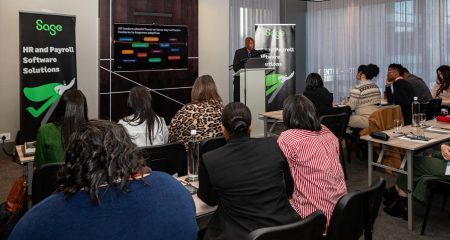 What lies ahead for the future of work is a question that weighs heavily on every CEO and HR leader – yet it holds few clear answers.
What lies ahead for the future of work is a question that weighs heavily on every CEO and HR leader – yet it holds few clear answers.
The almost overnight mass exodus to remote and now hybrid working models driven by the global pandemic caught most business leaders off-guard. However, these events highlighted the unpredictability of the future and made businesses realise they can take nothing for granted.
We are also witnessing the convergence of various forces that will profoundly alter the work landscape in the coming decade. From the rapid progression of artificial intelligence to the emergence of generation Z in the workforce, alongside the impacts of climate change and globalisation, these factors are driving significant social and economic shifts. Both employees and employers will need to cultivate adaptability to navigate this evolving terrain effectively.
While we have no real idea of the magnitude of the disruption ahead, it could well be as significant as the pandemic lockdowns or the introduction of the internet. McKinsey predicts that one in 16 employees may need to change occupations within the next six years. Similarly, the World Economic Forum’s research indicates that business owners foresee a labour market churn of nearly a quarter (23%) of jobs in the next five years – with many emerging jobs added and declining jobs disappearing altogether.
The impact of technology on working
The evolution of digital technologies are reshaping the work landscape. Amid the pandemic lockdowns, organisations swiftly transitioned to remote work, increased automation, and embraced digital commerce facilitated by cloud-based tools and high-speed internet connectivity. Covid-19 acted as a catalyst for accelerating digital transformation, and the momentum shows no signs of slowing down.
There is also an ongoing debate regarding the impact of AI on the workforce, with a growing consensus that millions of workers will need to undergo reskilling and upskilling to remain relevant in a shifting labor market. The WEF suggests that net employment could decline by 2% over the next five years, thanks to AI and other structural workforce changes.
Not long ago, the common assumption was that AI and intelligent automation threatened roles that required repetitive, routine, mundane tasks. However, the emergence of generative AI platforms such as ChatGPT suggests that even knowledge worker roles with substantial cognitive demands are vulnerable to disruption.
A new approach to talent acquisition
Meanwhile, the transition towards hybrid work has highlighted the potential for more fluid and decentralised work structures. Numerous entities were already exploring the use of offshoring, freelancers, contractors and gig economy platforms for specific roles. Covid-19 hastened this movement, demonstrating that certain tasks can be executed as effectively by those located remotely as by people in traditional office settings.
In this evolving landscape, there is a noticeable departure from the rigid hierarchies, compartmentalised corporate functions and exact job descriptions of the past. Teams may now be made up of a diverse mix of freelance, contract, gig economy and full-time workers, brought together for specific projects and disbanded upon completion.
 The four ‘Bs’ for businesses
The four ‘Bs’ for businesses
These developments show that businesses now have four strategic options, known as the four Bs, to determine how particular tasks, processes and roles are fulfilled. They can “buy” expertise from external service providers, such as vendors or contracting firms. Alternatively, they can “borrow” skills by engaging freelancers. They may also “build” their own talent pool by hiring full-time employees. Lastly, they can “bot” – automate – certain functions.
Interestingly, research by TestGorilla revealed that 39% of organisations are planning to increase their spending on skills-based hiring this year, and 58% of businesses plan to use skills-based hiring more moving forward. A staggering 89% percent of organisations said they improved employee retention when hiring for skills, and 74% claimed they cut hiring costs.
Win some, lose some
This trend significantly benefits companies, facilitating access to the necessary skills more efficiently at competitive rates, without necessarily increasing their operational costs. Moreover, it favours certain South African professionals that have rare and high-value skills. For instance, software developers can secure lucrative remote positions from overseas employers who compensate them in stronger currencies.
However, for many workers, this trend may undermine job stability and benefits. This means employers must proceed cautiously, particularly in a country marked by high unemployment rates and union opposition to job casualisation. South African HR leaders must strike a balance between capitalising on the opportunities offered by a more adaptable workforce and fulfilling their social responsibilities as well as adhering to labour laws.
To learn more about Sage, click here
An optimistic perspective suggests that modern technologies and work methodologies not only disrupt but also present ample opportunities to build more adaptable and inclusive workplaces. For instance, the shift to remote work enables companies to implement inclusive hiring strategies, supporting single parents, individuals with disabilities, and semi-retired professionals.
Augmenting human capabilities
Furthermore, technology can augment human capabilities rather than replace them. Few enjoy menial tasks such as data entry or meticulously reviewing Excel spreadsheets for errors. Machines can perform these tasks faster and with greater precision, allowing individuals to concentrate on more engaging and meaningful work that necessitates interpersonal skills or critical thinking.
Moreover, the numerous megatrends reshaping the work environment are not only seeing old job roles become obsolete but also generating new opportunities. Digitalisation opens doors for cloud architects and data scientists, while the transition towards sustainability necessitates the expertise of engineers and technicians.
 Some qualities can’t be replaced
Some qualities can’t be replaced
Businesses, governments, unions and employees need to collectively strategise on transitioning to the future of work in a manner that ensures job creation and enhances South Africa’s global competitiveness. The ageing workforce and labour shortages in affluent nations present significant opportunities for a country like South Africa, which is blessed with a vibrant young population.
Forward-thinking companies will embrace this new era with compassion, placing a strong emphasis on reskilling and upskilling their workforce to maintain relevance.
However, it’s crucial to recognise that AI and robots cannot replace qualities such as empathy, creativity, critical thinking, leadership, negotiation and innovation. Companies that prioritise these human attributes in their talent management approach can gain a distinct advantage in an era dominated by digital technology and automation.
To learn more about Sage, click here.
- Read more articles by Sage on TechCentral
- This promoted content was paid for by the party concerned




